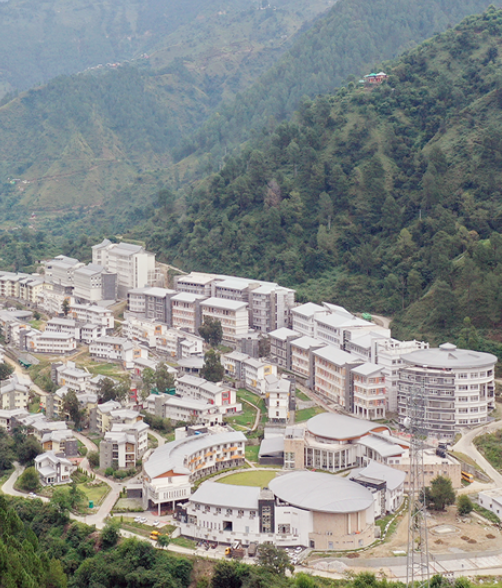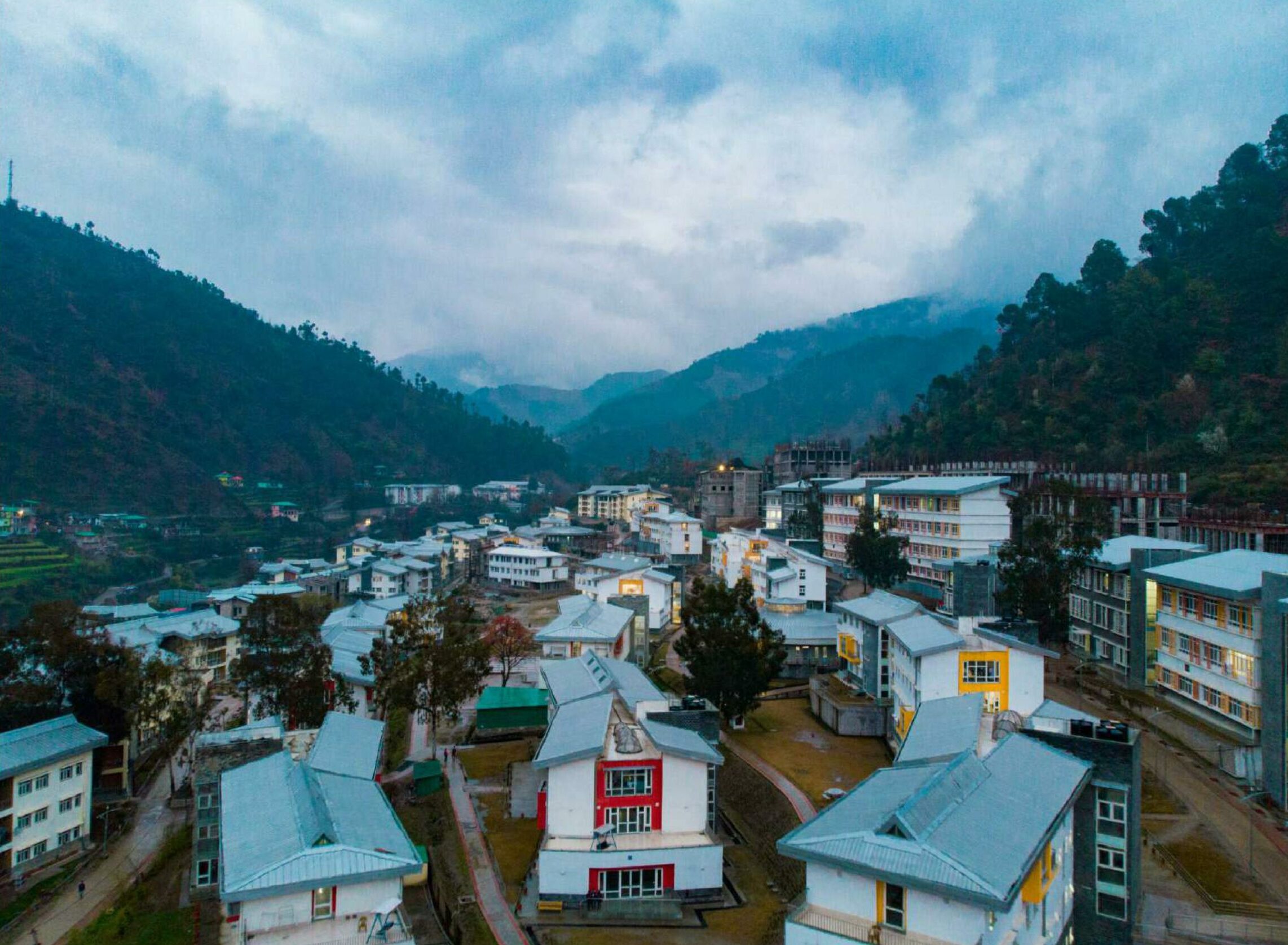
IIT Mandi has partnered with INRIA in France to create advanced Artificial Intelligence (AI) and signal processing techniques for accurately predicting the structural health of bridges and other structures.
The finding of these studies have recently been published in the journals Mechanical Systems and Signal Processing and Neural Computing and Applications, say sources from IIT Mandi.
 These papers are co-authored by Dr Subhamoy Sen, Associate Professor, School of Civil and Environmental Engineering and his research scholars Dr Smriti Sharma, Mr Eshwar Kuncham, and Ms Neha Aswal from IIT Mandi along with Dr Laurent Mevel from INRIA, Rennes, France.
These papers are co-authored by Dr Subhamoy Sen, Associate Professor, School of Civil and Environmental Engineering and his research scholars Dr Smriti Sharma, Mr Eshwar Kuncham, and Ms Neha Aswal from IIT Mandi along with Dr Laurent Mevel from INRIA, Rennes, France.
Bridges play a vital role in India’s infrastructure, with nearly 13500 of them across the country. These structures undergo natural ageing due to environmental factors like temperature fluctuations, and water and air exposure, compounded by heavy road traffic, say sources from IIT Mandi.
Traditionally, assessing bridge conditions has relied on visual inspections, a method considered inadequate by experts. It falls short in detecting all structural issues and is subjective and time-consuming, involving manual analysis of numerous photographs, say sources from IIT Mandi.
Recent advances in instrumentation, data analysis, and artificial intelligence (AI) tools like Deep Learning (DL) hold great promise for structural health monitoring (SHM) of bridges and other structures, say sources from IIT Mandi.
These technologies make it easier to detect, measure, understand, and even predict the evolution of defects over time. This, in turn, enables more effective planning of renovation or repair work, ultimately reducing maintenance costs and extending the lifespan and availability of bridges, say sources from IIT Mandi.
 Team
TeamThe research team at IIT Mandi has developed a Deep Learning (DL)-based SHM approach. Their AI algorithms can identify and isolate structural damages by analysing recorded ambient dynamic responses, all without the need for human intervention.
Also read – 10 Indian Women Engineers and Scientists inspiring Future Generations
Elaborating on their work, Dr Subhamoy Sen, IIT Mandi, said, they have employed data-driven methods like Machine Learning, AI, and Bayesian statistical inference to estimate a bridge’s health and predict its remaining usable life.
This outcome has the potential to reduce risks to infrastructure under operational and adverse loading conditions, said Dr Subhamoy of IIT Mandi.
Temperature fluctuations can greatly affect a bridge’s dynamic traits, especially prestressed concrete, and cable-stayed bridges.
It is therefore important to consider these temperature effects in both real-time and AI-based SHM.
IIT Mandi’s algorithm was rigorously validated on a real bridge in a cold region with extreme annual and daily temperature swings.
To assess the algorithm’s damage detection capabilities, the researchers initially tested it on an undamaged real bridge.
Subsequently, they intentionally induced damage in the computer model to evaluate the algorithm’s accuracy in pinpointing the damage’s location.
This testing confirmed the algorithm’s efficacy in identifying structural damage.
In another related study, the researchers used advanced filtering techniques to estimate the condition of different structural components without the need for direct measurement of their connections.
This technique enables the separate assessment of each component’s health, which can in turn help in evaluating overall structural integrity.
The method was validated using computer simulations of a beam exposed to various forces and demonstrated robust performance in handling challenges like background noise and damage severity.
 Applications
ApplicationsThe researchers state that these AI-based algorithms have broad applications, not limited to bridges alone, and can be extended to structures such as ropeways, buildings, aerospace structures, transmission towers, and various infrastructure elements requiring periodic health assessments and protection measures.
IIT Mandi has nine Academic Schools and five major Research Centers. The Schools are the School of Biosciences and Bioengineering (SBBE), School of Chemical Sciences (SCS), School of Mathematical and Statistical Sciences (SMSS), School of Physical Sciences (SPS), School of Mechanical and Materials Engineering (SMME) School of Civil and Environmental Engineering (SCENE), School of Computing and Electrical Engineering (SCEE), School of Humanities and Social Sciences (SHSS), and School of Management (SOM).
The Centers are Advanced Materials Research Centre (AMRC), Centre for Design and Fabrication of Electrical Devices (C4DFED), BioX Centre, Indian Knowledge System and Mental Health Applications Centre (IKSMHA Centre) and Centre for Artificial Intelligence and Robotics.
The Institute offers B.Tech. programs in seven different streams, one M.A. program, ten M.Tech. programs, nine Ph.D. programs, and one iPh.D. program.
The unique, project-oriented B.Tech. curriculum is centered around its 4-year long Design and Innovation stream. Since the inception of the Institute, IIT Mandi faculty have been involved in over 275 Research and Development (R&D) projects worth more than Rs. 120 crores.
It established the IIT Mandi iHub and HCI Foundation (iHub; a section-8 company) on its campus at Kamand with significant funding of INR 110 crores from the Department of Science and Technology (DST), Government of India.
The iHub is planned to fuel research and technology development, skill development, startup and innovation, and collaborations in the HCI and allied AI/ML areas in India.
This organization is the only second-generation IIT to be featured at rank 7 in the Atal Ranking of Institutions on Innovation Achievements of the Innovation Cell, Ministry of Education, Govt. of India.
S Vishnu Sharmaa now works with collegechalo.com in the news team. His work involves writing articles related to the education sector in India with a keen focus on higher education issues. Journalism has always been a passion for him. He has more than 10 years of enriching experience with various media organizations like Eenadu, Webdunia, News Today, Infodea. He also has a strong interest in writing about defence and railway related issues.
6 Sep, 2024
4 Sep, 2024
31 Aug, 2024
29 Aug, 2024
12 Aug, 2024
12 Aug, 2024
11 Aug, 2024
11 Aug, 2024
10 Aug, 2024